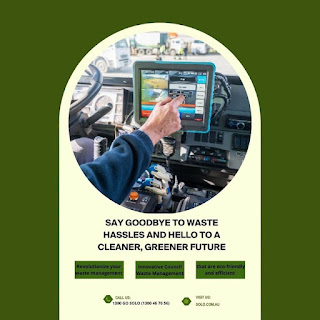Bin There, Done That? The Challenges and Opportunities of Council Waste Management
At Solo Resource Recovery, we've been at the forefront of the Australian waste management industry for decades, and we've witnessed firsthand the evolution of council waste management – from the days of simple kerbside collection to the complex, multifaceted systems we see today. While significant progress has been made, the ever-growing volume of waste and an increasing focus on sustainability present both challenges and opportunities for councils and waste management businesses alike.
The Current
Landscape of Council Waste Management
Australian councils play a vital role
in waste management, providing essential services like kerbside collection,
recycling programs, and landfill management. However, they face a multitude of
challenges, including:
·
Cost Pressures: Councils have to balance the need for effective waste
management with budgetary constraints, and the rising costs of landfill space,
processing facilities, and fuel put pressure on council budgets, making it
difficult to invest in new technologies and initiatives.
·
Public Expectations: Community expectations for waste
management are constantly evolving, and residents are demanding more
comprehensive recycling programs, reduced landfill reliance, and improved
transparency.
·
Infrastructure Limitations: Many councils struggle with ageing
infrastructure, particularly in regional areas. Limited capacity at processing
facilities and a lack of advanced sorting technologies restricts the efficiency
and effectiveness of waste management programs.
·
Contamination in Recycling: Contamination of recycling bins with
non-recyclable materials remains a significant issue. This reduces the quality
of recycled materials, increases processing costs, and can even lead to entire
loads being rejected by recycling facilities.
Opportunities
for Innovation and Collaboration
Despite these challenges, exciting
opportunities exist for councils and waste management businesses to work
together to create a more sustainable future for waste management in Australia.
Here at Solo, we see several key areas for progress:
·
Education and Engagement: Empowering residents through
education campaigns and clear communication plays a crucial role in reducing
contamination and increasing recycling rates. Solo works closely with councils
to develop tailored education programs that resonate with local communities.
This can involve educational materials, community workshops, and interactive
online platforms.
·
Investment in Technology: Advanced sorting technologies like
optical sorters and artificial intelligence can significantly improve the
efficiency and accuracy of separating recyclable materials. Solo actively
invests in the latest technologies to ensure effective processing for council
waste streams.
·
Expansion of Recycling Programs: Expanding the range of materials
accepted in council recycling programs can significantly divert waste from
landfill. This requires collaboration between councils, waste management businesses,
and reprocesses to ensure there are viable markets for recycled materials.
·
Exploring Alternative Treatment Options: Waste-to-energy
facilities and organic waste composting offer promising alternatives to
traditional landfilling. Solo is committed to working with councils to explore
these options and develop sustainable solutions that meet local needs.
·
Public-Private Partnerships: Strong partnerships between councils
and waste management businesses like ours can leverage expertise and resources
to drive positive change, and collaboration allows for the sharing of best
practices, joint investment in new technologies, and the creation of innovative
waste management solutions.
Solo:
Partnering for a Sustainable Future
At Solo Resource Recovery, we are
committed to being a valued partner for councils in navigating the
ever-changing landscape of waste management, and we offer a comprehensive suite
of waste management services, including:
·
Kerbside collection services tailored to council requirements
and local demographics.
·
Advanced sorting facilities equipped with the latest
technology to ensure efficient and accurate processing of recyclable materials.
·
Dedicated account managers who work closely with council
staff to understand their specific needs and challenges.
·
Educational resources and community engagement programs to
help residents understand and participate effectively in waste reduction and
recycling initiatives.
·
Continuous investment in research and development to explore
innovative technologies and solutions for the future of waste management.
We believe that through
collaboration, innovation, and a shared commitment to sustainability, councils
and Solo can work together to achieve significant progress, and by tackling the
challenges head-on and seizing the opportunities for improvement, we can build
a more sustainable future for waste management in Australia, one where waste is
minimised, resources are recovered, and our environment is protected.
The Future
of Council Waste Management
The future of council waste
management requires a collective effort. Households need to commit to waste
reduction and proper sorting practices, and councils need to develop
forward-thinking policies and invest in innovative infrastructure and waste
management businesses like Solo need to provide the expertise and technology to
ensure efficient and sustainable waste processing.


Comments
Post a Comment